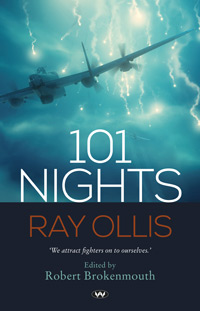Ray Ollis’ fictionalised memoir of his time in the RAF Bomber Command was first published in 1957 and drew on his own recent memories, log books and diaries.
This new edition is edited by Robert Brokenmouth, who corrected some spelling and transposition errors from the original. Brokenmouth has not changed the story but has added notes, a bibliography and biographical information to present a more rounded picture of the period and of the author. His biographical information notes that Ollis himself was badly affected by his wartime experiences and often suffered from depression. Ollis was later diagnosed as bi-polar and, following his release from a mental hospital in 1972, killed himself.
 At Vincent’s (the character who represents Ollis) first briefing he discovers that their squadron has an added task – as well as bombing runs over Germany, Squadron 101 carries ‘Specials’, German speakers who try to misdirect German operations. Of course, breaking into German radio transmissions also allows the 101 planes to be located. As the Skipper notes, “In protecting the bomber force as a whole, we attract fighters to ourselves.”
At Vincent’s (the character who represents Ollis) first briefing he discovers that their squadron has an added task – as well as bombing runs over Germany, Squadron 101 carries ‘Specials’, German speakers who try to misdirect German operations. Of course, breaking into German radio transmissions also allows the 101 planes to be located. As the Skipper notes, “In protecting the bomber force as a whole, we attract fighters to ourselves.”
The novel has touches of a Boys Own Adventure, with everyone having nicknames and sayings such as ‘Wizard prang!’ and ‘Topping!’ which is not surprising when one considers that the average age of a Lancaster bomber crew was 22. The camaraderie which quickly developed between the crew is a vital part of the story. Knowing that you and/or your mates might be killed on the next raid made friendships more intense and yet, at the same time, the survivors could not spend long mourning their loss. The tradition in the squadron was to have a final drink to send the lost crewmen on their way into the next world and then not to mention them again.
Ollis’ account does not shy away from acknowledging the dreadful toll the bombing campaign had on German cities, especially civilians. He writes too about the psychological strain of being in Bomber Command. The character of Yarpi, one of the gunners, blacks out on a flight and has a mental ‘imp’ who chides him, “You fool! …You’re too sick to fly. Tell them!” – but he is too afraid to say that he’s ill and not coping with the rigours of Bomber Command. Yarpi dreaded being branded a coward or LMF (Lacking Moral Fibre) and the author turns him into a saboteur who is actually relieved when caught as he no longer has to fly.
The cavalier attitudes of the characters towards women are probably typical of wartime, and likely a combination of their youth, the daily hazards and likelihood of dying. In his biographical section, Brokenmouth asserts that Ollis’ account gives lots of attention to women. This may be so but, with the exception of officer’s wives, the attention is hardly positive. Women are portrayed as sexual objects and playthings, often out to ‘catch’ a man and of easy virtue being known as ‘Popsies’ and ‘Night Fighters’. The vital work of the WAAF in communications and meteorology on the base or women across the country who did vital, often dangerous war work goes unacknowledged.
Despite these reservations I enjoyed the book. Ollis cleverly maintains the suspense, and the descriptions of the fighter attacks, flak on bombing raids when the plane is hit, or a crash landing behind German lines are gripping.
Reviewed by: Jan Kershaw
Publisher: Wakefield Press
Release Date: 2016
RRP: $29.95 paperback
Rating out of 10: 6




















